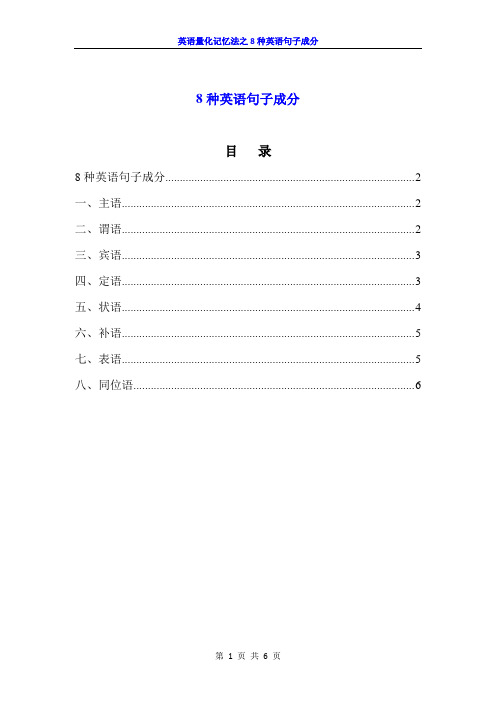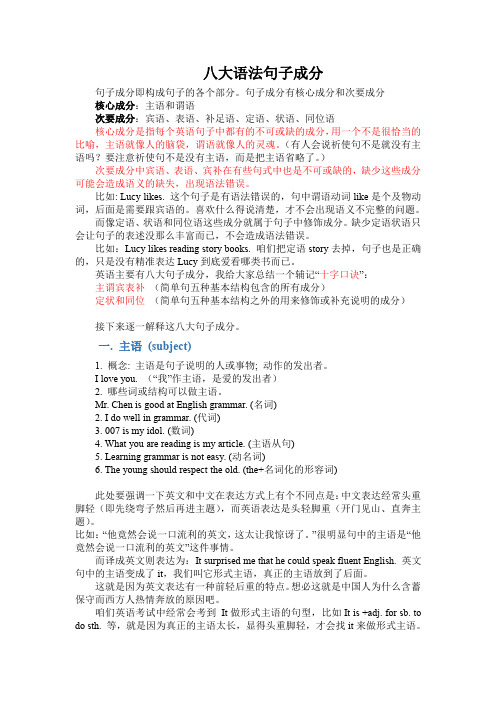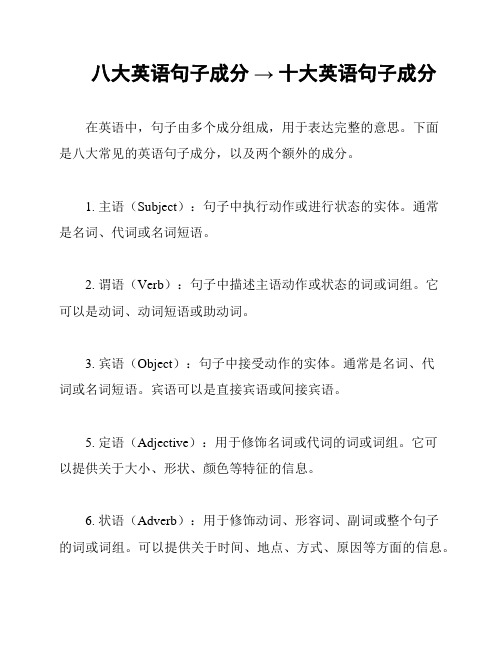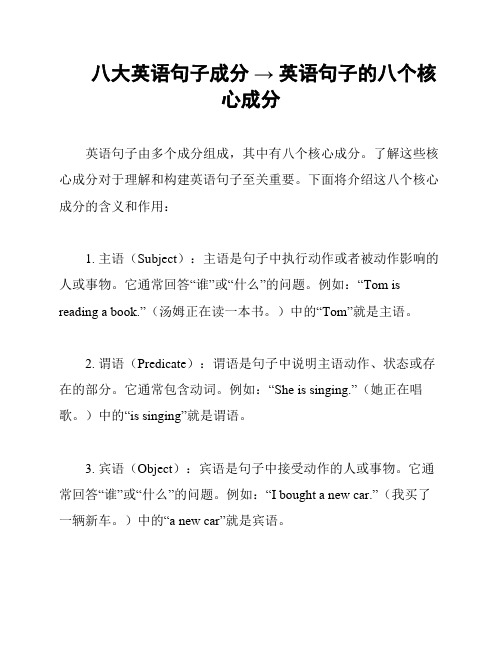英语句子八大成分
总结英语八大句子成分

英语八大句子成分句子的主要成分是主语和谓语,次要成分包括宾语,定语,状语,表语等。
1)主语:常用n./pron./num./to do/doing/从句(主语从句)担任,一般放于句首。
如:Students study.We are friends.20 years is not a short time./ 80,000miles is a long journey.To see is to believe.If buying a bag of candies doesn’t appeal to you, how about buying a tree?What he said impressed me most.★祈使句的主语往往省略。
Hurry up,please.2)谓语:(时态和语态)表示主语的行为或状态,常用vi./vt./系动词或动词词组担任,放主语后。
如:She cried.He left.We will arrive soon.He failed the exam.He gave me a gift.I found the book interesting.She remained young after 10 years.3)宾语:表示动作的对象,常见的有动宾、介宾和形宾。
常由n./pron./num./to do/doing/句子(宾语从句)担任。
①vt+oHe passed the exam. I received a message.②vt+indirect object+direct OI’ll fetch you a chair. He passed the salt to me. I chose a book for me.此类动词有:give, teach, buy, lend, find, hand, leave, sell, show, read, pay, make, offer, build, pass, bring, cook, refuse注:见附录一跟双宾的动词③vt+O+OC★He made the girl laugh.注:见附录二跟宾和宾补的动词注:“动词+副词+宾语”,如果宾语是代词,放中间:Please put the shoes away. /Please put away the shoes. / Please put them away. (请把它们收起来。
8种英语句子成分(英语量化记忆法)

英语量化记忆法之8种英语句子成分8种英语句子成分目录8种英语句子成分 (2)一、主语 (2)二、谓语 (2)三、宾语 (3)四、定语 (3)五、状语 (4)六、补语 (5)七、表语 (5)八、同位语 (6)8种英语句子成分句子是按照一定的语法规律组成的,表达一个完整的意义。
一个句子一般由两部分构成,即主语部分和谓语部分,这两部分也叫做句子的主要成分。
句子的次要成分包括宾语,定语,状语,补语,表语,同位语等。
句子成分是句子中起一定功用的组成部分。
一、主语主语:是句子叙述的主体,句子一般要有主语。
在简单句中,主语一般可由名词、代词、数词、名词化的形容词、不定式、动名词和主语从句等来承担,一般放于句首。
动名词、动词不定式作主语时通常用it作形式主语。
1、名词作主语English is very important.The students all love their English teacher.2、代词作主语They go to school by bus.Most of the students come from the countryside.3、动名词作主语Watching TV too much is bad for your eyes.It’s no use regretting it.4、动词不定式作主语To see is to believe.It is very hard to get to sleep.二、谓语谓语:说明主语所发出的动作或具有的特征和状态。
谓语必须由动词充当,动词不定式、动名词、分词为非谓语动词不能作谓语。
可作谓语的动词一般为行为动词(表动作)和连系动词(表状态),行为动词根据其后是否可直接接宾语,又可分为及物动词和不及物动词。
1、及物动词作谓语We should help each other.All of the students like the novel.Did you see many people there?2、不及物动词作谓语He left here yesterday.You’re driving too fast.The teacher came in, book in hand.3、连系动词谓语He is an excellent teacher.Her son is a friend of ours.The box itself is not so heavy.三、宾语宾语:是动作的对象或承受者,常位于及物动词或介词后面,一般可分为动词宾语和介词宾语。
英语八大语法句子成分

八大语法句子成分句子成分即构成句子的各个部分。
句子成分有核心成分和次要成分核心成分:主语和谓语次要成分:宾语、表语、补足语、定语、状语、同位语核心成分是指每个英语句子中都有的不可或缺的成分,用一个不是很恰当的比喻,主语就像人的脑袋,谓语就像人的灵魂。
(有人会说祈使句不是就没有主语吗?要注意祈使句不是没有主语,而是把主语省略了。
)次要成分中宾语、表语、宾补在有些句式中也是不可或缺的,缺少这些成分可能会造成语义的缺失,出现语法错误。
比如:Lucy likes.这个句子是有语法错误的,句中谓语动词like是个及物动词,后面是需要跟宾语的。
喜欢什么得说清楚,才不会出现语义不完整的问题。
而像定语、状语和同位语这些成分就属于句子中修饰成分。
缺少定语状语只会让句子的表述没那么丰富而已,不会造成语法错误。
比如:Lucy likes reading story books.咱们把定语story去掉,句子也是正确的,只是没有精准表达Lucy到底爱看哪类书而已。
英语主要有八大句子成分,我给大家总结一个辅记“十字口诀”:主谓宾表补(简单句五种基本结构包含的所有成分)定状和同位(简单句五种基本结构之外的用来修饰或补充说明的成分)接下来逐一解释这八大句子成分。
一.主语(subject)1.概念:主语是句子说明的人或事物;动作的发出者。
I love you.(“我”作主语,是爱的发出者)2.哪些词或结构可以做主语。
Mr.Chen is good at English grammar.(名词)2.I do well in grammar.(代词)3.007is my idol.(数词)4.What you are reading is my article.(主语从句)5.Learning grammar is not easy.(动名词)6.The young should respect the old.(the+名词化的形容词)此处要强调一下英文和中文在表达方式上有个不同点是:中文表达经常头重脚轻(即先绕弯子然后再进主题),而英语表达是头轻脚重(开门见山、直奔主题)。
八大英语句子成分 → 十大英语句子成分

八大英语句子成分→ 十大英语句子成分在英语中,句子由多个成分组成,用于表达完整的意思。
下面是八大常见的英语句子成分,以及两个额外的成分。
1. 主语(Subject):句子中执行动作或进行状态的实体。
通常是名词、代词或名词短语。
2. 谓语(Verb):句子中描述主语动作或状态的词或词组。
它可以是动词、动词短语或助动词。
3. 宾语(Object):句子中接受动作的实体。
通常是名词、代词或名词短语。
宾语可以是直接宾语或间接宾语。
5. 定语(Adjective):用于修饰名词或代词的词或词组。
它可以提供关于大小、形状、颜色等特征的信息。
6. 状语(Adverb):用于修饰动词、形容词、副词或整个句子的词或词组。
可以提供关于时间、地点、方式、原因等方面的信息。
7. 介词短语(Prepositional Phrase):由介词及其宾语组成的短语,用于修饰其他成分并表示位置、方向、时间等关系。
8. 独立成分(Independent Construction):在句子中起到补充说明或表达感叹的作用,不与其他成分有直接的句法关系。
例如:插入语、感叹句、祈使句等。
除了上述八大成分,还有两个常见但不是必须的成分:9. 联系词(Conjunction):用于连接单词、短语、从句等成分的词或词组,可表达并列、顺承、转折等关系。
10. 从句(Clause):包含主谓关系的句子,可以作为主句、宾语、状语等成分的一部分。
以上是英语句子中常见的十大成分。
了解和掌握这些成分可以帮助我们更好地理解和运用英语。
请在写句子时注意这些成分的使用和搭配,以构建准确和流畅的语句。
高中英语必会的8大基本句子成分

高中英语必会的8大基本句子成分无论是“理解”还是“表达”,均需建立在准确理解句子成分基础上。
一个句子若没有句子成分的合理架构、有序排列,就会杂乱无章,不知所云。
所以,学好语法,应从正确划分句子成分入手。
众所周知,句子有若干个组成部分,它们分别承担着不同的作用,组成句子的各个部分叫作句子成分。
英语中的句子成分分为主语(subject)、谓语(predicate)、宾语(object)、表语(predicative)、定语(attribute)、状语(adverbial)、补语(complement)和同位语(appositive)八种。
一、主语习惯于发号施令,偶尔也会被赶下台在句子中,主语是执行句子的行为或动作的主体。
主语一般位于句子开头,且不能省略。
但在某些特定的句式里,如:疑问句、倒装句、祈使句、感叹句等,句子主语也可以“下台”而位于谓语动词之后或省略。
能够充当主语的主要有名词(短语)、代词、数词、动名词(短语)、动词不定式(短语)和从句等。
真题例句1. (2020ꞏ新课标山东卷)The route went from our school gate to the foot of the South Mountain.(名词作主语)2. (2020ꞏ全国卷Ⅱ,满分作文)Taking part in a fruit picking activity on a farm is meaningful and rewarding.(动名词短语作主语)3. (2017ꞏ全国卷Ⅰ,书面表达) To start with, what I intend to stress is that we are about to start our next lesson in Classroom 8 of the Teaching Building at 10 a.m. next Friday.(从句作主语)4. (2019ꞏ全国卷Ⅱ书面表达)The competition will begin at 2 pm and last for roughly 3 hours.(名词作主语)5. (2019ꞏ全国卷Ⅰ书面表达)To let China go to the world and let the world understand China is my first aim.(不定式短语作主语)6. (2019ꞏ江苏高考书面表达)It seems to me that thetraditional Chinese dress will make the occasion very Chinese and inviting to theBritish students.(代词it 充当形式主语,that引导的主语从句作真正的主语)[名师指津]当从句作主语时,为避免头重脚轻,可用it作形式主语。
八大英语句子成分 → 英语句子的八个核心成分

八大英语句子成分→ 英语句子的八个核心成分英语句子由多个成分组成,其中有八个核心成分。
了解这些核心成分对于理解和构建英语句子至关重要。
下面将介绍这八个核心成分的含义和作用:1. 主语(Subject):主语是句子中执行动作或者被动作影响的人或事物。
它通常回答“谁”或“什么”的问题。
例如:“Tom is reading a book.”(汤姆正在读一本书。
)中的“Tom”就是主语。
2. 谓语(Predicate):谓语是句子中说明主语动作、状态或存在的部分。
它通常包含动词。
例如:“She is singing.”(她正在唱歌。
)中的“is singing”就是谓语。
3. 宾语(Object):宾语是句子中接受动作的人或事物。
它通常回答“谁”或“什么”的问题。
例如:“I bought a new car.”(我买了一辆新车。
)中的“a new car”就是宾语。
5. 定语(Adjective):定语是句子中修饰名词或代词的成分。
它通常回答“怎样的”、“哪一个”的问题。
例如:“The blue car is mine.”(那辆蓝车是我的。
)中的“blue”就是定语。
6. 状语(Adverbial):状语是句子中修饰动词、形容词、副词或整个句子的成分。
它通常回答“怎样”、“在何处”、“为何目的”等问题。
例如:“He runs slowly.”(他跑得慢。
)中的“slowly”就是状语。
7. 定语从句(Relative Clause):定语从句是一个从句,用来修饰前面的名词或代词,并进一步说明其特征。
例如:“The book that I read is interesting.”(我读的那本书很有趣。
)中的“that I read”就是定语从句。
8. 状语从句(Adverbial Clause):状语从句是一个从句,用来修饰整个句子、动词、形容词或副词。
它通常回答“为什么”、“当”、“在哪里”等问题。
例如:“I will go shopping after I finish my work.”(我完成工作后会去购物。
英语八大句子成分
英语八大句子成分英语句子有八大成分,它们分别是:主语、谓语、表语、宾语、定语、状语、同位语和补语。
一、主语主语是句子的中心,是句子的表明者,由名词或代词构成,也可由介词短语或名词性从句构成。
主语位于谓语之前,它是谓语动词谓语动词所指的人或物。
如:Tom likes music。
(汤姆喜欢音乐)二、谓语谓语是句子的核心,它表示一个动作或一种状态,句子中一般位于主语之后,常由动词构成,也可以是一个动词短语。
如:Tom likes music。
(汤姆喜欢音乐)三、表语表语也称肯定语,作用是对句子的主语做出描述,表语由形容词、副词、介词短语或名词性从句构成,位于谓语动词之后。
如:John isa student.(约翰是一名学生)四、宾语宾语是动词的受事,由名词或代词构成,位于谓语动词之后。
宾语一般代表谓语动词的承受者,一般来说句子中的宾语都在谓语之后,与谓语动词形成主谓结构。
如:The teacher taught us English.(老师教我们英语)五、定语定语修饰句子中的名词,一般位于名词之前,由形容词、名词所有格、动名词或介词短语构成,可放在句子中,也可位于句子的末尾。
如:This is the man who helped me.(这就是帮助我的人)六、状语状语是一个句子的补充成分,它修饰说明句子的时间、地点、原因、条件等状态,由副词、介词短语、状语从句等构成。
它多放在句首,有时也放在句子末尾。
如:I often go to the library after school.(放学后我经常去图书馆)七、同位语同位语是一个名词性成分,用于替代另一个名词,同位语位于句子中,它与主语之间有关联,并对主语作出解释。
它可以由名词、代词、形容词、介词短语、分词短语、副词和名词性从句等构成,如:He is a teacher, an occupation he loves.(他是一名老师,是他喜欢的职业)八、补语补语是句子的完成成分,用于对谓语动词进行补充,补语可以由形容词、介词短语或名词性从句构成,补语位于谓语动词之后,它对谓语动词作出补充说明。
八大英语句子成分 → 英语句子的八个基本成分
八大英语句子成分→ 英语句子的八个基本成分英语句子是构建英语语言的基本单位,它由八个基本成分组成。
了解这些成分有助于我们正确理解和使用英语句子。
下面是英语句子的八个基本成分:1. 主语(Subject):主语是句子中执行动作或被描述的人、物、事物或概念。
它通常位于句子的开头,并与动词一起构成谓语部分。
例如:Mary *is* a teacher.Mary *is* a teacher.2. 谓语(Predicate):谓语是句子中描述主语动作、状态或存在的部分。
它通常包含一个动词,但也可能有其他补足成分。
例如:Mary *is* a teacher.a teacher.3. 宾语(Object):宾语是句子中接受动作的人、物、事物或概念。
它通常跟在动词后面,帮助说明动作的目标或作用对象。
例如:Mary teaches English.English.4. 定语(Adjective):定语用来描述或修饰名词或代词。
它通常位于名词前面,提供额外的信息或限制名词的范围。
例如:The tall man is my brother.The tall man is my brother.5. 状语(Adverb):状语用来描述或修饰动词、形容词、副词或整个句子。
它可以提供时间、地点、方式、原因等方面的信息。
例如:He runs quickly.quickly.7. 状语从句(Adverbial Clause):状语从句是一个句子,用来作为一个整体修饰另一个句子中的动词、形容词或副词。
它提供了额外的信息,如时间、条件、目的等。
例如:He went to bed after he finished his homework.after he finished his homework.8. 定语从句(Adjective Clause):定语从句是一个句子,用来修饰名词或代词。
它通常用来提供关于名词或代词的进一步描述或限制。
英语句子八大成分
英语句子八大成分
英语句子八大成分:主语、谓语、宾语、表语、定语、状语、补语、同位语。
一.主语
主语是句子所要说明的人或事物。
二.谓语
谓语是说明主语的动作或状态的部分。
三.宾语
宾语表示及物动词的对象或内容。
四.表语
表语是在系动词之后表示主语的性质、状态或身份的部。
五.定语
定语用于限定或修饰名词或代词。
六.状语
状语用于修饰动词、形容词、副词或整个句子。
七.补语
补语用于补充说明主语或宾语。
八.同位语
同位语用于名词或名词短语后,进行补充说明。
英语语法——英语句子成分分析
英语语法——英语句子成分分析I.八大成分的概念和构成1.主语(名词代词形):句子的主体,是谓语陈述,说明的对象。
2.谓语:表示主语的行为或进行的活动。
3.宾语:行为或活动的对象,接受者或受影响者。
5.补语:补充说明。
(由动词类别来决定)6.定语:对名词性形式进行范围限定。
7.同位语:对被修饰对象进行补充说明或进一步解释。
8.状语:修饰词,短语,从句和整句。
位置:自由自在。
1)修饰性状语:(时间,地点,肯定,否定,程度,频度,方式,伴随,原因,目的,比较等)。
2)连接性状语:(顺序,递进,转折,让步,结果,推论,比较)。
3)评述性状语:修饰整个句子,表示说话人的看法或态度。
II.成分关系1.补语跟着宾语表语跑:补语跟在宾语和表语的后面构成宾补和表补。
把有宾补的句子变成被动语态,则宾补就变成了主补。
To love others makes us happy…to love ourselves makes us lonely.(宾补)We are made happy to love others…we are made lonely to love ourselves.(主补)爱他人使我们幸福,在自己使我们孤单。
2.定语,同位(语)专把名词踹:定语,同位语修饰名词性形式Experience is the best teacher.(被定语所修饰的形式为名词)They are going to Melbourne, the beautiful city in southern Australia.(同位语所修饰的形式为名词)3.谓语动词由状语修饰When you reach for the stars, you may not quite get one, bu t you won’t come up with a handful of sand either.你想摘下天上的星星,可能一个也摘不下;但也不会一无所获。
- 1、下载文档前请自行甄别文档内容的完整性,平台不提供额外的编辑、内容补充、找答案等附加服务。
- 2、"仅部分预览"的文档,不可在线预览部分如存在完整性等问题,可反馈申请退款(可完整预览的文档不适用该条件!)。
- 3、如文档侵犯您的权益,请联系客服反馈,我们会尽快为您处理(人工客服工作时间:9:00-18:30)。
英语句子成分讲座主语句子一般要有主语。
在简单句中,主语一般由名词、代词、动名词或动词不定式(短语) 来充当。
动名词、动词不定式作主语时通常用 it 作形式主语。
■名词作主语English is very important. 英语是很重要的。
The students all love their English teacher. 这些学生都爱他们的英语老师。
■代词作主语They go to school by bus. 他们乘公共汽车上学。
Most of the students come from the countryside. 大多数学生来自农村。
■动名词作主语Watching TV too much is bad for your eyes. 看电视太多对你的眼睛是有害的。
It’s no use regretting it. 后悔是无用的。
■动词不定式(短语)作主语To see is to believe. 眼见为实。
It is very hard to get to sleep. 入睡谓语谓语必须由动词充当,但动词不定式、动名词、分词为非谓语动词不能作谓语。
可作谓语的动词一般为行为动词(表动作)和连系动词(表状态),行为动词根据其后是否可直接接宾语,又可分为及物动词和不及物动词。
■及物动词作谓语We should help each other. 我们应该互相帮助。
They respect one another. 他们互相尊重(对方)。
All of the students like the novel. 所有这些学生都喜欢这本小说。
Did you see many people there? 你在那儿看见许多人了吗?■不及物动词作谓语He left here yesterday. 他昨天离开这儿。
You’re driving too fast. 你开车开得太快了。
The teacher came in, book in hand. 老师走进教室,手里拿着书。
He went abroad in the September of 1988. 他于1988年9月出国。
■连系动词表状态He is an excellent teacher. 他是位优秀的教师。
Her son is a friend of ours. 她的儿子是我们的朋友。
Ours is a great country. 我们的国家是一个伟大的国家。
The box itself is not so heavy. 箱子本身并不重。
表语表语与连系动词连用,构成系表结构,说明主语的身份或特征,一般由形容词、名词、动名词词、动词不定式、分词等充当。
如:They are brother and sister. 他们是兄妹。
Her father is sixty-five. 她父亲65岁。
John is captain of the team. 约翰是足球队的队长。
The poor boy was myself. 那个可怜的孩子就是我自己。
All you need do is to take a taxi from the airport. 你只需从机场打个的即可。
My favourite sport is swimming. 我最喜爱的运动是游泳。
宾语宾语是行为动作的对象,一般可分为动词宾语和介词宾语,充当宾语的可以是名词、代词、动名词、动词不定式或整个句子。
如:I like Chinese food. 我喜欢中国菜。
I bought a ticket for Milan. 我买了一张去米兰的车票。
I enjoyed talking to you. 我和你谈话很高兴。
Have you finished dressing? 你衣服穿好了吗?He certainly did not want to join them. 他确实不想参加他们的活动。
They decided to close the border. 他们决定封闭边境。
We hoped that all would come well. 我们希望一切都会好转。
We expected that you would stay for a few days. 我们预计你会待几天的。
定语定语为句子的次要成分,起修饰限制名词或代词的作用,可分为前置定语和后置定语。
一般由形容词性物主代词、数词、形容词、副词、介词短语、动词不定式、分词(短语) 或句子充当。
His father is a doctor. 他父亲是一名医生。
Mr. Green has two sons. 格林先生有两个儿子。
The girl under the tree is Kate. 在树底下的那个女孩是凯特。
The man downstairs couldn’t sleep well. 楼下的那个人不能睡好觉。
I bought a new dictionary. 我买了本新字典。
Can you find out the answer to the question?你能找到这个问题的答案吗? Would you like something to drink? 你想要些喝的东西吗?A man going to die is always kind-hearted. 人之将死,其言也善。
The suggestion sent to the committee was adopted. 送往委员会的建议被采纳了。
Do you know the man who is standing next to Mr. Green? 你认识站在格林先生旁边的那个人吗?状语英语中的状语用来修饰动词、形容词或副词,主要由副词、介词短语、动词不定式、分词充当或由连词引导状语从句,表示时间、地点、程度、目的、方式,比较、让步、条件、原因、结果、伴随等。
(1) 时间状语I often get up at 5:30 in the morning. 我常常在早上5:30起床。
Hearing the news, they felt very excited.听到这个消息,他们感到很兴奋。
(2) 地点状语Pandas only live in China. 熊猫仅生活在中国。
(3) 目的状语We’ll go to the beach for a picnic this Sunday. 这个星期天我们将去沙滩野炊。
He took some change from his pocket to buy a newspaper. 他从口袋里掏出一些零钱来买报纸。
She got up early so that she could catch the first bus. 她早早地起床,以便能够赶上这辆早班车。
(4) 方式状语We usually go to school on foot. 我们通常步行去上学。
Please do it as I told you. 请按我告诉你的去做。
(5) 让步状语Though she has a lot of money, she is unhappy. 虽然她很有钱,而她并不幸福。
No matter what happens, I will never lose heart. 无论发生什么,我将决不失去信心。
(6) 条件状语If you don’t work hard, you’ll fall behind the others. 假如你不努力学习,你将落后于别人。
Given more attention, the flowers would have grown better. 如果给予更多的关心的话,这些花将长得更好。
(7) 原因状语We didn’t go to the park because of the bad weather. 由于天气不好,我们没有去公园。
Being ill, he didn’t go to school. 由于病了,他没有去上学。
(8) 结果状语The wind was so strong that we could hardly move forward. 风是如此地猛烈,以致于我们寸步难行。
He left early, so that he caught the train. 他早早地离去,(结果) 因此赶上了火车。
(9) 伴随状语The doctor hurried off, with a medicine box under his arm. 这位医生匆匆离去,胳膊下夹着一个药箱子。
The teacher came into the classroom, followed by a group of his students. 老师进到教室里来,后面跟着一群学生。
宾语补足语宾语补足语主要用来补充说明宾语,与宾语之间存在逻辑上的主谓关系或动宾关系,可由名词、形容词、动词不定式、分词等充当。
如:Tom found the climb quite easy. 汤姆觉得爬山很容易。
Please call me Jim. 不要这样正规,叫我吉姆好了。
You must keep it clean. 你要把它保持干净。
I have the car waiting. 我让汽车等着。
We had the machine repaired. 我们请人修理了机器。
Why don’t you have your hair cut? 你为什么不理发?He had his finger cut. 他的手指弄伤了。
I had my watch stolen yesterday. 我的表昨天被人偷去了。
She has plenty of clothes to wear. 她有足够的衣服穿。
He made me repeat the story. 他要我把那事重讲一遍。
Rain makes plants grow. 雨水使植物生长。
注意:后跟名词作宾语补足语的动词有 call, name, think, make, choose 等,后跟形容词作宾语补足语的谓语动词有 keep, find, get, think, make 等。
动词不定式作宾语补足语时,当谓语动词为感官动词(如 feel, see, hear, notice, watch, observe, listen to, look at 等),使役动词(如 let, have, make 等),动词不定式不带to主语补足语The door was painted white.The old man was found weak.练习句子成分练习题( 一 )(一). 指出下列句中主语1. The teacher with two of his students is walking into the classroom.2.The useful dictionary was given by my mother last year.3. To do today's homework without the teacher's help is very difficult.(二) 选出句中谓语1.I don't like the picture on the wall.② The days get longer and longer when summer comes.③ Do you usually go to school by bus?④ There will be a meeting at the library this afternoon.⑤ Did the twins have porridge for their breakfast?⑥ Tom didn't do his homework yesterday.⑦ What I want to tell you is this.⑧ We had better send for a doctor.⑨ He is interested in music.(三) 挑出下列句中的宾语① My brother hasn't done his homework.② People all over the world speak English.③ You must pay good attention to your pronunciation.⑤Some of the students in the school want to go swimming,⑥ The old man sitting at the gate said he was ill. .⑧ Go across the bridge and you will find the museum on the left.⑨ You will find it useful after you leave school.⑩ They didn't know who "Father Christmas" really is.(四) 挑出下列句中的表语① The old man was feeling very tired.② Why is he worried about Jim?③ The leaves have turned yellow.④ Soon They all became interested in the subject.⑤ She was the first to learn about it.(五) 挑出下列句中的定语1. What is your given name?2. On the third lap are Class 1 and Class3.3. The man downstairs was trying to sleep.4.He is a famous star.5.Who’s that girl in red?6.A suitcase that doesn’t have handles is useless.7.The blue suitcase ,which doesn’t have handles, is useless.(六) 挑出下列句中的宾语补足语① She likes the children to read newspapers and books in the reading-room.② He asked her to take the boy out of school.③ She found it difficult to do the work.④ They call me Lily sometimes.⑤ I saw Mr Wang get on the bus.⑥ Did you see Li Ming playing football on the playground just now?挑出句子中的状语① There was a big smile on her face.② Every night he heard the noise upstairs.③ He began to learn English when he was eleven.⑤ With the medicine box under her arm, Miss Li hurried off.⑥ She loves the library because she loves books.⑦ I am afraid that if you've lost it, you must pay for it.⑧ The students followed Uncle Wang to see the other machine.(八) 划出句中的直接宾语和间接宾语① Please tell us a story.② My father bought a new bike for me last week.③ Mr Li is going to teach us history next term.④ Here is a pen.Give it to Tom.⑤ Did he leave any message for me?句子成分练习题( 二 )指出下列句子中划线部分的句子成分:1.Whether we’ll go depend on the weather .2. People’s standards of living are going up steadily .3. That was how they were defeated.4.The nursery takes good care of our children .5.I’ll return the book to you tomorrow .6.We are sure that we shall succeed .7.The woman with a baby in her arms is his other .8.There are many film that I’d like to see.9.Have you met the person about whom he was speaking ?10.I have a lot of work to do .11. Anyway I won’t stop you from doing it .12. I said it in fun .13. We can send a car over to fetch you .14. She had to work standing up .15. Seeing this ,some comrades became very worried .16. Much interested , he agreed to give it a try .17. The bus arrived ten minutes late .18. We should serve the people heart and soul.19. Spring coming on , the tree turned green .20. Some farmers saw something strange in the sky .21. We think it necessary that everyone should attend the meeting .22. It’s strange that she doesn’t come today .23. It was in the library that I come today .24. He likes drawing at times when he isn’t working .25. We left in such a hurry that we forgot to lock the door.。
